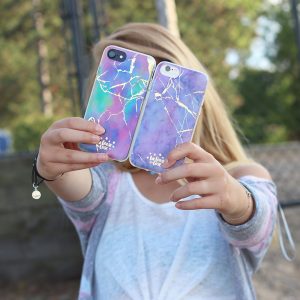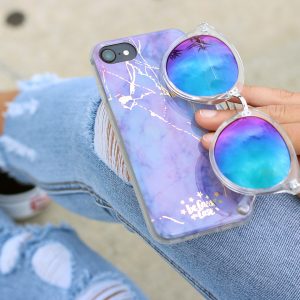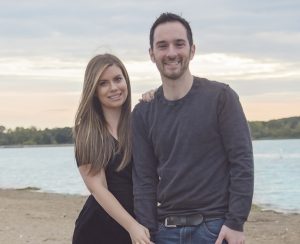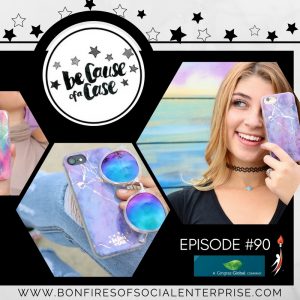The Bonfires of Social Enterprise with Romy of Gingras Global | Social Enterprise | Entrepreneurship in Detroit
«
»
S3: Because of a Case #90
Manage episode 309036511 series 3025717
Because of a Case
Hear from Jamie and Sean Strasberger talking about their business, Because of a Case. Because of a Case is a mobile phone case design company contributing to our favorite special causes. And, of course, we have a great song at the end by a Detroit artist for your listening pleasure.
For the full transcript click below
Hey Everyone, It’s Romy and I am back with great conversations on the Bonfires of Social Enterprise. Today we have Jamie and Sean Strasberger talking about their business, Because of a Case. And, of course, we have a great song at the end by a Detroit artist for your listening pleasure. Let’s kick it off here with a fun fuel from Natalie Hazen; she always comes up with the best fun fuels!
Hello, I’m Natalie Hazen bringing you this episodes’ Fun Fuel.
Mobile phones have become such a part of everyone’s daily life that if you can’t find your phone, that can be a giant disrupter to your day! Been there!
Phones have become so mainstream and normal, that a recent post on Facebook about an anniversary reminded me how far we have come in our technology with phones. This post was celebrating the 25th Anniversary of the first ever text message.
In 1992, 22 year old British software engineer, Neil Papworth, sent the first ever SMS from a computer to his colleague, Richard Jarvis at Vodafone. That very first text message sent on December 3rd ,1992 simply said, “Merry Christmas.”
Perhaps you remember your first text message and who it was from such as those defining moments in history where you can state your exact location and what you were doing at that moment. That was honestly no me. But now who would of thought that 25 years later it is normal to communicate via text and also send streams of happy faces, smiling little piles of poo and all sorts of characters!
So happy anniversary text message and hats off to wonderful innovators such as Neil Papworth. Now on to our episode.
Well, who knew, texting has been around for longer than I thought! That’s great. Let’s slide on over to another seat where we move our discussion to the designed mobile phone cases that bring funding to causes while they bring joy to the texters! Here is a part of my conversation with Jamie and Sean Strasberger of Because of a Case
Romy: Let's help our listeners understand what your business is and does.
Jamie S: Okay. We're a phone case company, and for every case we sell, we donate a portion to different charities. We have a phone case that we donate a portion to the Sea Turtle Conservancy, and it has sea turtles on it, metallic gold foil. We have all different designs that coordinate with different charities.
Sean S: For sure, so another organization, the Anxiety ... Association ... What?
Jamie S: Anxiety and Depression Association of America.
Sean S: Anxiety and Depression. Do that one. We have a lot of animal causes. We have a lot of human causes. We just cover a lot of different bases, and we donate anywhere from 10% of net profits all the way up to 75% for a couple of our causes.
Romy: Is the case designed for that particular cause? Am I saying that right?
Jamie S: Yeah. Some of them will have a design that we want to use, with a charity in mind. Then we contact the charity after we have the design, and show them what we're thinking. Other charities have helped us design it using their colors or their logo, and we use some of those graphics in mind when we design them for the different charities.
Romy: How do you get the charities to participate? What's been your method of solicitation? I don't feel like that's the right word, that's my geeky finance person coming out.
Jamie S: Yeah.
Sean S: It's been interesting, just because I think before we started the company, we had this idea, "Oh, we're going to help people," and that was the social aspect of it where we really wanted to bring on as many organizations, with as many causes that we were passionate about, and our followers and customer base was passionate about.
We found that there's, for some of these charities, there's a lot of hoops to jump through to get them on board. You have to have a certain amount of minimum sales. There's just, depending on the charity, they're not ... Not every charity's wiling to have you on board. They need to make sure you're a legitimate company. They don't just take anybody on, which I guess I think we found kind of surprising at first, just because like, "Hey, you know, we're willing to help everybody."
Jamie S: At the beginning, we're like, "We want to donate. Can somebody let us donate to your charity." But it is about just approaching them, and especially in the beginning, we approached a lot of charities. Some of them were really open to us, and really excited about working together. Some of them, yeah, we had to have a minimum sales. So it was just about making sure we approached enough charities to get enough on our site, and enough to coordinate with our different phone cases.
Sean S: I think part of that is just because there's so many organizations out there that are similar in a sense that they're donating a portion of sales. That was one of the unique niches for us, where we found a hole, was that ... Like for T-shirt companies for instance, there's so many social enterprises that were T-shirt companies, where they donate a portion of sales. But with phone cases, when we started, and still at this point, there's not really, there wasn't a leader. So we kind of carved our niche there, and I think we're able to get more charities and organizations on board, because we're the go to charity phone case company.
Romy: Really exciting.
Jamie S: Yeah, and we have had a couple approach us since we've gotten a bit bigger. Sometimes we'll go through emails and have some charities that now we have to look into and see if we want to work with them. So that's pretty cool too.
Sean S: At least, in the beginning, I know, it was just as hard to get charities on board as it was to find social influencers or celebrities on board, like it was ... Jamie had to work her tail off to prove our worth to them a lot of the time.
Romy: So they were almost vetting you as a vendor, even though part of the proceeds were going to go back.
Jamie S: Yeah. They just wanted to make sure that we were legitimate. We were going to donate to them. They wanted to make sure that we were going to be good to work with, and there was a lot of factors in some of them. Some of them were easier, though, to get.
Romy: Yeah.
Sean S: Absolutely.
Romy: It is interesting. You need people to start to buy ... You got the chicken and egg thing going there. You know. I really want to help you and help each other.
Jamie S: That's exactly it.
Romy: Let's go back and tell, maybe the story about what inspired you to get started, or what was the light bulb moment.
Sean S: That goes back to Jamie, because she got her degree in teaching, but I think it was back in 2008, 2009, where the economy wasn't doing as well. So she couldn't find a teaching job. So she had to find something else to do. That's what started it.
Jamie S: Yeah, so I was looking for different things to do. I was substitute teaching, but it wasn't really bringing in enough money. It was hard to get even subbing positions at the time, so I was really just looking for anything I could do. I had a job where I was working ... I got a job I found at, in a department store working at a cosmetics counter. I really liked doing that, and I've always liked makeup and hair. So I started a YouTube channel, and I thought I could play off on this. I built up my audience, and I have about 60,000 subscribers on my channel.
Romy: Oh, my goodness.
Jamie S: I was reviewing all kinds of different products and makeup and hair and food, and just anything.
Sean S: Stuff on Shark Tank. As seen on TV. All that sort of stuff.
Jamie S: Yeah. My channel name is Reviews by Jamie, if anyone wanted to check it out. But I do all kinds of reviews.
Me and Sean were always talking about, we need to come out with a product that my audience would really like, because I knew my audience really well, and they're very loyal, and they're always commenting, and they're so sweet.
Sean S: I think the first thing we thought of was, we were thinking about some sort of a jam, as a play off the Jamie Jammers.
Jamie S: My name.
Sean S: We threw that around for a little bit. We threw all sorts of stuff around.
Jamie S: Yeah, which would still be fun to do, but I really noticed that a lot of people were interested in phone cases. So we thought, "Oh this could be fun." I love designing things and I have a good eye for what's trending. I think we could come up with some great designs. We actually sat on that for a couple of years, just going back and forth. Should we start? Should we not? And then-
Sean S: We went through this one company where you could actually buy all the equipment to make your own phone cases. That was kind of like a big leap for us, because we were always the type of people who never had a late credit card bill. Everything was like always very in order. We kind of had to take a little credit out to get that ... All right, let's leap, and little did we know, that was not even close to how far ...
Jamie S: It was nothing compared to what we've spent now. It was a $3,000 machine.
Sean S: Yeah, at the time it felt like, holy moly, we were really taking a big risk here. So we bought this crazy machine.
Jamie S: But we're not the type that can use something like that and make it work. You had, there was a lot of steps involved, and we didn't make one phone case that looked good. So I was like, "This isn't going to work. We can't sell these." I'm a perfectionist too, so there would be little flaws on the printing.
Sean S: You literally, you printed out the designs on this special printer, and then you'd use this heat press, which we put in the basement, which yeah, and then you heated it on in the toaster oven, and it was...
Jamie S: You had to have special gloves for it, and I was like, "Sean, you can't use this. You're going to burn yourself."
Sean S: Yeah, I'm a little clumsy when it comes to that kind of ... yeah.
Jamie S: So we're like, we need ... We'll think of a different way for it. We really started talking, "Okay, we could do something more with this." I was having a lot more ideas for designs. Then we had the idea, after talking about donating a portion of every sale, and particularly to mental health, because I've struggled with anxiety, just generalized anxiety since I was a kid. So I thought this would be really cool, because we thought of a really good slogan, and it was, "Find your happy case," instead of, "Find your happy place."
Romy: Oh, I like that.
Sean S: When it started, it was actually everything was going towards helping mental health. We found this great organization, Minding your Mind, which we still work with a little bit, where they actually do mindfulness classes in elementary and middle, high schools. They do more workshops and trainings around the country to bring more awareness. [crosstalk 00:08:36]
Jamie S: All these things I wish I would've had just growing up. So it's really cool, and we still work with an ADAA, but then we started having customers who were requesting different causes. So we thought, could we add more? Could we make it different? So we changed our slogan, and now it's, "Protect your phone. Protect the world."
Romy: Ah, I like that.
Sean S: Registered trademark.
Jamie S: Yeah.
Romy: Registered trademark. Very nice. Well, I love that. So you abandoned the idea of doing the equipment. I guess I'd call that manufacturing it yourself.
Jamie S: We're not DIY people at all.
Sean S: No. Not with anything. We're not the Pinterest [inaudible 00:09:19]. With cooking maybe, but other than that ...
Jamie S: Yeah.
Romy: But you do have this idea of design, which is great. An eye of what ...
Jamie S: Yeah. I think I'm pretty good at finding what, and knowing what people want to see, because it's really what I want to see too. I'm really drawn to all the trendy things, and I'm pretty on top of it too, and I'll have some ideas for different designs, and then we'll see other companies do them a little bit after. We're like, "Oh, I think we were on the right track with that."
Sean S: Much bigger companies, where it's frustrating, and we're like, we just had that idea a week ago.
Jamie S: Yeah, things we didn't, we weren't able to come out with, that we see other companies do.
Sean S: I think the funny thing too, is just like looking back to when we had that machine, which we somehow were able to get it right up on Craigslist. I'm still ... Whoever's using that, I hope it's going well-
Sean: ... Get it right up on Craigslist. Whoever's using that, I hope it's going well for them.
Jamie: I warned them too, I was very straightforward. I said, "It's very hard to use, I don't want you to burn yourself. We had a hard time making the cases", but they still wanted it.
Sean: They did.
Romy: Thank goodness there's buyers out for all kinds of stuff in the world that we live in, this time in history.
Jamie: There's always somebody who wants something you're selling.
Romy: Anyways, you decided not to be DYIers. How did you discover the steps to do it differently then?
Sean: The funny thing about that is I think we've slowly discovered, and we had a little experience because right after college we both started a videography company, where we would do weddings and bar mitzvahs. I think that gave us a lot of insight, and actually we're doing that again now. We just recently started doing it again after a little bit.
I think that really gave us a lot of insight into knowing what you can do and what you can't do. For us, Jamie initially, just because she's got an artistic...
98集单集










